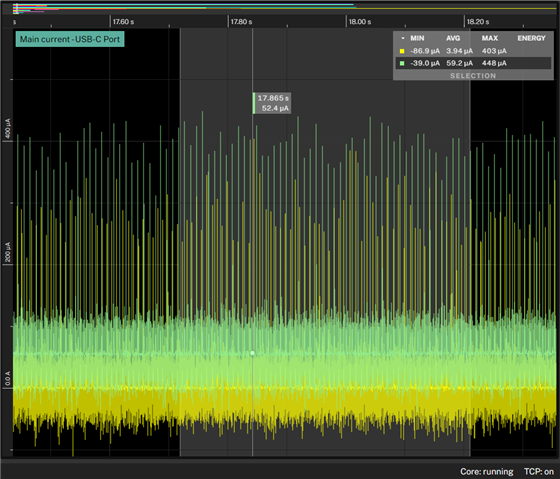Hello,
I am working on incorporating flash logging into an application that has a GRTC-driven EGU interrupt (capture/compare event). Here is where I am setting up the EGU and connecting it to the GRTC Capture/Compare event with a PPI channel. The GRTC is used for timed interrupts so that I do not have to use the Zephyr timer module (uses more energy).
Called from main upon application startup
void init_ppi_egu() {
#if defined(__ZEPHYR__)
IRQ_CONNECT(NRFX_IRQ_NUMBER_GET(NRF_EGU_INST_GET(10)), IRQ_PRIO_LOWEST,
NRFX_EGU_INST_HANDLER_GET(10), 0, 0);
#endif
nrfx_err_t status;
int err;
nrf_egu_task_t egu_event = NRF_EGU_TASK_TRIGGER0;
uint8_t ppi_chan_grtc_int;
nrfx_egu_t egu_inst = NRFX_EGU_INSTANCE(10);
void * p_context = "Some context";
status = nrfx_egu_init(&egu_inst, 5, egu_handler, p_context);
nrfx_egu_int_enable(&egu_inst, (uint32_t)1);
if (nrfx_gppi_channel_alloc(&ppi_chan_grtc_int) != NRFX_SUCCESS) {
printk("Failed allocating PPI chan for grtc interrupt\n");
}
nrfx_gppi_channel_endpoints_setup(ppi_chan_grtc_int,
nrf_grtc_event_address_get(NRF_GRTC, nrf_grtc_sys_counter_compare_event_get(grtc_channel)),
nrfx_egu_task_address_get(&egu_inst, egu_event));
nrfx_gppi_channels_enable(BIT(ppi_chan_grtc_int));
}In a separate config file, flash_logging.conf:
CONFIG_FLASH=y CONFIG_FLASH_MAP=y CONFIG_FLASH_PAGE_LAYOUT=y CONFIG_FLASH_LOG_LEVEL_DBG=y CONFIG_LOG_BACKEND_FS=y CONFIG_FILE_SYSTEM=y CONFIG_FILE_SYSTEM_LITTLEFS=y CONFIG_LOG_MAX_LEVEL=3 CONFIG_LOG_TIMESTAMP_64BIT=n CONFIG_LOG_RUNTIME_FILTERING=y CONFIG_LOG_BACKEND_UART=y CONFIG_SHELL_LOG_BACKEND=n # Log backend config CONFIG_LOG_BACKEND_FS_FILE_SIZE=40960 CONFIG_LOG_BACKEND_FS_FILES_LIMIT=3
If both flash logging AND the EGU interrupt is used, the UART output is only giving me ~1 log line every second in the log, but the EGU interrupt is working.
If I don't call the init_ppi_egu function out of main, and I just run the application as normal, the logging outputs at normal speed (for flash logging enabled).
Also, if I disable flash logging, and leave the EGU interrupt as is, the logging outputs at normal speed (for flash logging disabled).
I already tried messing with the egu10 peripheral interrupt priority and set it lower to see if maybe that was the issue, but it did not help.
Is there anything that I may be doing wrong?
Many thanks!



